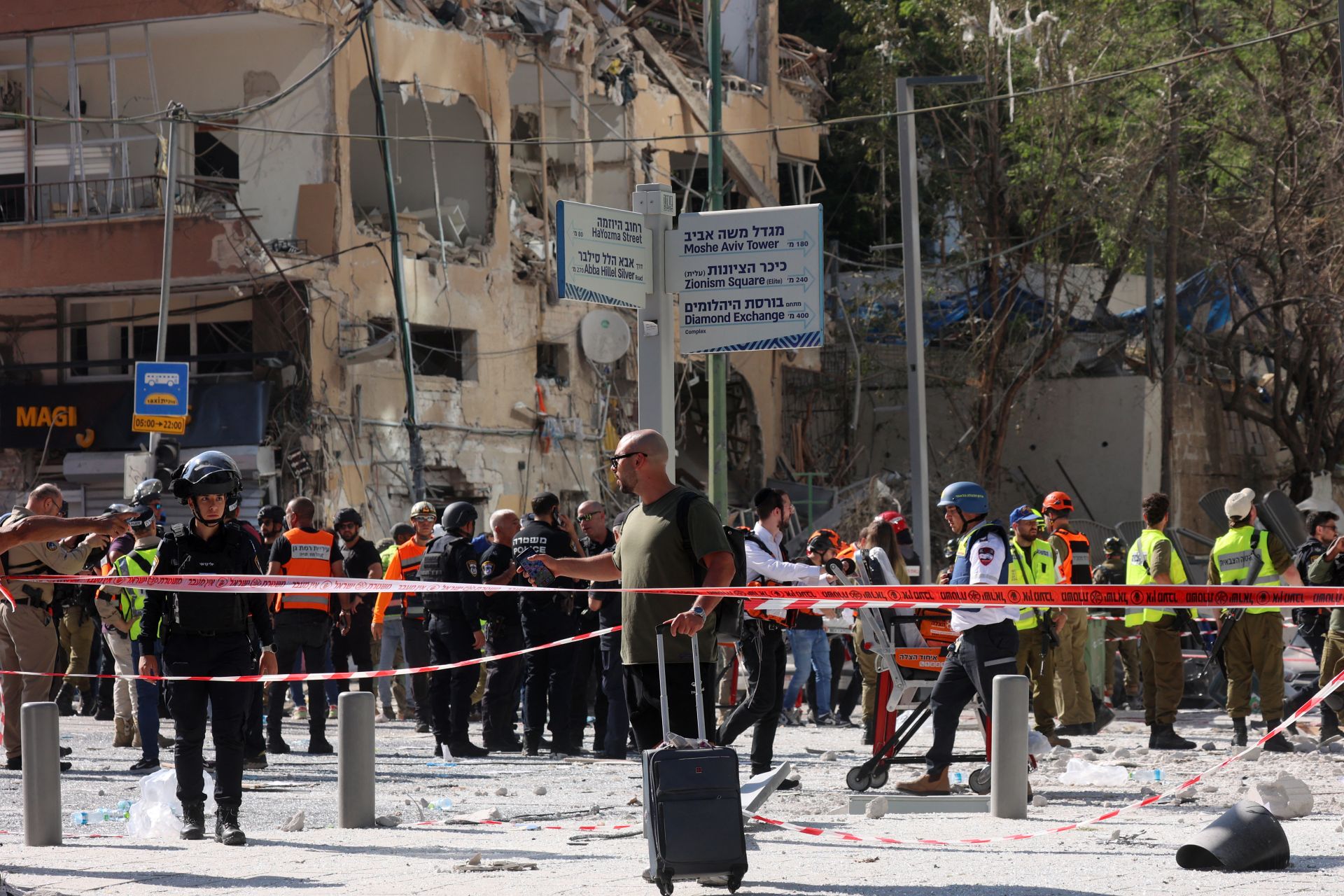- Home
- Middle East
- Israel Says It Expects a “Prolonged” War With Iran

A man walks with a suitcase past first responders gathering outside a heavily-damaged building at the site of an Iranian missile attack in Ramat Gan in central Israel near Tel Aviv, on June 19, 2025 ©(GIL COHEN-MAGEN / AFP)
Israel declared on Friday that it was expecting a “prolonged” war against Iran, as talks were underway in Geneva between Tehran and European powers, focusing on Iran’s nuclear program.
A week after the outbreak of the conflict—triggered by an unprecedented Israeli attack on Iran on June 13, the two countries have continued to exchange volleys of missiles.
Deeming the possibility of negotiations with Tehran “substantial,” U.S. President Donald Trump announced on Thursday that he would give himself “two weeks” to decide on a possible American military intervention alongside Israel against Iran.
Claiming that Iran was on the verge of acquiring a nuclear bomb, Israel launched a massive aerial campaign against the Islamic Republic, striking hundreds of military and nuclear sites, killing senior commanders as well as nuclear scientists.
Iran, which has responded with missile and drone attacks targeting Israel, denies seeking to build a nuclear weapon but insists on its right to develop a civilian nuclear program.
The head of the International Atomic Energy Agency (IAEA), Rafael Grossi, said that his agency had found no evidence in its latest report suggesting that Iran is currently building a nuclear weapon.
“We have launched the most complex campaign in our history (...) We must be prepared for a prolonged campaign,” said Israeli Chief of Staff Lieutenant General Eyal Zamir in a video message addressed to “the citizens of Israel.”
“Despite significant progress, difficult days lie ahead. We are preparing for many scenarios,” he added.
Missile Strikes
In the afternoon, Iran launched a barrage of missiles toward Israel, injuring 19 people according to a hospital in Haifa (north), where at least one building was hit.
The Islamic Revolutionary Guard Corps (IRGC), Iran’s ideological military force, said in a statement that it had targeted “military centers, defense industries, command and control centers,” as well as military bases in Israel.
Earlier in the day, warning sirens were heard in southern Israel, where an Iranian strike hit Beersheva, causing damage.
The Israeli military announced that it had struck surface-to-air missile launchers in southwestern Iran, after bombing targets in Tehran, Isfahan (central Iran), and the country’s west.
Israeli bombings have killed at least 224 people in Iran. In Israel, Iranian missile and drone strikes have left 25 people dead.
On Thursday, Israeli Prime Minister Benjamin Netanyahu stated that “any help is welcome” in destroying Iran’s nuclear facilities.
The United States is the only country in possession of the GBU-57 bomb, capable of reaching the deeply buried core of Iran’s nuclear program at the Fordow enrichment plant south of Tehran.
Anti-Israel Protests
In Tehran, thousands of people took to the streets, chanting slogans in support of their leaders and against Israel and the United States. They burned and trampled on Israeli and American flags.
“I will sacrifice my life for my Guide,” read one banner, referring to Supreme Leader Ali Khamenei, who has been directly threatened by Israel and its American ally.
The United Kingdom and several other countries, including Switzerland—which represents U.S. interests in Tehran—announced they had withdrawn their diplomatic staff from Iran.
Severe Consequences
Addressing the UN Security Council on Friday, Mr. Grossi warned that a potential attack on Iran’s nuclear power plant in Bushehr (south) would have the most “severe” consequences, potentially releasing large amounts of radiation into the environment.
He also affirmed that the IAEA could “guarantee, through an indisputable inspection system, that nuclear weapons will not be developed in Iran.” “A diplomatic solution is possible if the political will exists.”
The U.S. government announced new sanctions aimed at preventing Tehran from obtaining components essential to its defense industry.
A 2015 agreement aimed at regulating Iran’s nuclear program—concluded with major powers—collapsed in 2018 after the unilateral withdrawal of the United States and the reimposition of U.S. sanctions on Tehran, under President Trump’s first term.
In response, Iran breached some of its commitments, accelerating uranium enrichment.
Iran has enriched uranium to a high level of 60%, according to the IAEA—close to the 90% threshold required to produce a nuclear bomb.
Israel maintains ambiguity around its own nuclear arsenal but is believed to possess 90 nuclear warheads, according to the Stockholm International Peace Research Institute (SIPRI).
By Chloe Rouveyrolles-Bazire, Sébastien Ricci and Ahmad Parhizi, AFP
Read more



Comments